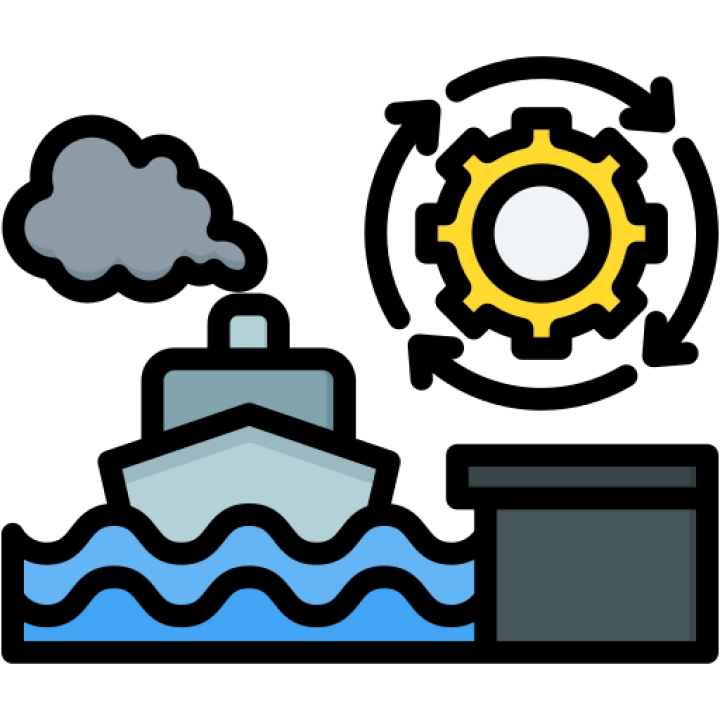Faculty: Logistics
The Port and Maritime Management major focuses on the planning, operation, and enhancement of maritime transport and port facilities. Students gain skills in maritime logistics, port operations, supply chain management, maritime law, and environmental sustainability, preparing for careers in maritime transport, port management, logistics, and related fields.
Learning Objectives:
- Understand the principles of port and maritime management.
- Develop skills in maritime logistics and port operations.
- Learn supply chain management in the maritime sector.
- Explore maritime law and regulations.
- Analyze environmental sustainability in port and maritime management.
- Develop critical thinking, problem-solving, and decision-making skills.
- Gain practical experience through projects and internships.
Main Curriculum:
- Introduction to Port and Maritime Management - Overview of the principles of port and maritime management, history, and industry trends.
- Maritime Logistics - Basics of managing maritime transport operations and logistics.
- Port Operations - Principles of managing port facilities, including terminal operations, cargo handling, and ship management.
- Supply Chain Management in the Maritime Sector - Techniques for managing supply chains specific to the maritime industry.
- Maritime Law and Regulations - Understanding maritime laws, international conventions, and regulatory compliance.
- Maritime Safety and Security - Methods to ensure safety and security in maritime operations and port facilities.
- Environmental Sustainability in Maritime and Port Management - Strategies for implementing sustainable practices in maritime and port operations.
- Economics and Finance of Maritime Transport - Understanding economic and financial aspects of shipping and port management.
- Maritime Technology and Innovation - Exploring emerging technologies and innovations in the marine industry.
- Project Management in Maritime and Port Operations - Principles of managing maritime projects, including planning, execution, and control.
- Portfolio Development - Creating a professional portfolio showcasing maritime and port management skills.
- Internship - Real-world experiences in shipping companies, port authorities, logistics firms, or maritime consulting firms.
- Final Project - Comprehensive project applying maritime and port management skills, such as developing a port operations plan, conducting a maritime logistics analysis, or implementing a sustainability initiative.
Assessment Methods:
- Analysis of maritime and port management principles
- Maritime logistics projects
- Port operations projects
- Supply chain management in maritime sector projects
- Maritime law and regulations projects
- Maritime safety and security projects
- Environmental sustainability in maritime and port management projects
- Maritime economy and finance projects
- Maritime technology and innovation projects
- Project management in maritime and port operations projects
- Portfolio development projects
- Practical/Internship reports
- Graduation projects and presentations
Recommended Textbooks:
- "Introduction to Maritime and Port Management"
- "Maritime Logistics"
- "Port Operations"
- "Supply Chain Management in the Maritime Sector"
- "Maritime Law and Regulations"
- "Maritime Safety and Security"
- "Environmental Sustainability in Maritime and Port Management"
- "Maritime Economy and Finance"
- "Maritime Technology and Innovation"
- "Project Management in Maritime and Port Management"
- "Port Operations"
- "Portfolio Development"
Prerequisites:
Basic knowledge of transport principles and economics and an interest in maritime and port management.
Duration of the Major:
Typically 4 years to obtain a Bachelor's degree in Maritime and Port Management.
Certification:
Graduates may obtain certifications such as:
- Certified in Logistics, Transportation, and Distribution (CLTD)
- Certified Supply Chain Professional (CSCP)
- Certified Port Executive (CPE)
- Certificates in specific maritime and port management programs
Target Audience:
Aspiring maritime managers, port operators, logistics specialists, and professionals seeking careers in shipping companies, port authorities, logistics firms, maritime consulting firms, and related fields. This major provides students with the managerial, analytical, and technical skills necessary to excel in maritime and port management, supporting careers in various roles within shipping companies, port authorities, logistics firms, maritime consulting firms, and related fields.



